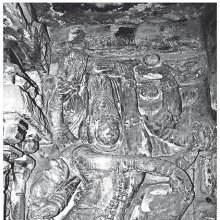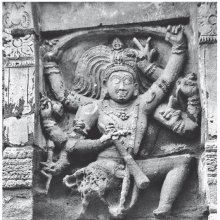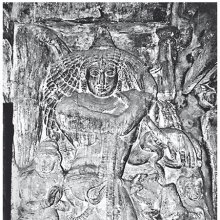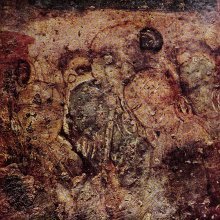Mahendravarman, Mahendra-varman: 6 definitions
Introduction:
Mahendravarman means something in Hinduism, Sanskrit, the history of ancient India. If you want to know the exact meaning, history, etymology or English translation of this term then check out the descriptions on this page. Add your comment or reference to a book if you want to contribute to this summary article.
Images (photo gallery)
In Hinduism
Kavya (poetry)
Source: Wisdom Library: Kathāsaritsāgara1) Mahendravarman (महेन्द्रवर्मन्) is the name of a King, whose daughter was named Pāṭalī, according to the Kathāsaritsāgara, chapter 3. Their story is told in the tale called ‘the founding of the city of Pāṭaliputra’.
2) Mahendravarman (महेन्द्रवर्मन्) is the name of a king of Ujjayinī, which is described as “the ornament of the earth”, according to the Kathāsaritsāgara, chapter 11. His story is told in the “story of king Caṇḍamahāsena”. The king Mahendravarman had a son named Jayasena, who in turn had a son named Mahāsena, who later became known as Caṇḍamahāsena, after he made an oferring with pieces of his own flesh to the goddess Durgā.
The Kathāsaritsāgara (‘ocean of streams of story’), mentioning Mahendravarman, is a famous Sanskrit epic story revolving around prince Naravāhanadatta and his quest to become the emperor of the vidyādharas (celestial beings). The work is said to have been an adaptation of Guṇāḍhya’s Bṛhatkathā consisting of 100,000 verses, which in turn is part of a larger work containing 700,000 verses.

Kavya (काव्य, kavya) refers to Sanskrit poetry, a popular ancient Indian tradition of literature. There have been many Sanskrit poets over the ages, hailing from ancient India and beyond. This topic includes mahakavya, or ‘epic poetry’ and natya, or ‘dramatic poetry’.
India history and geography
Source: Wisdom Library: India HistoryMahendravarman I (महेन्द्रवर्मन्) (600–630 CE) is the name of a Pallava king who was defeated by Pulakeśin II, who was the son of Kīrtivarman who was son the son of Pulikeśin I. Pulakeśin II was the real maker of the Calukya Empire though he struggled for the throne with his uncle Maṅgaleśa.
Source: Shodhganga: The significance of the mūla-beras (history)Mahendravarman I (AD 600-630) is the name of a king from the Pallava dynasty.—The Pallavas ruled Kanchi in the 4th century AD and it was during the period of Mahendravarman I, the son of Simha Visnu, that importance was given to the arts. He was responsible for the introduction of rock-cut architecture in the Tamil country early in the 7th century AD. He studded his kingdom with rock-cut monuments. He is considered the pioneer of South Indian architecture and painting. He discarded perishable materials such as brick, timber, metal or mortar for constructing temples and introduced cutting images out of the hard rock.

The history of India traces the identification of countries, villages, towns and other regions of India, as well as mythology, zoology, royal dynasties, rulers, tribes, local festivities and traditions and regional languages. Ancient India enjoyed religious freedom and encourages the path of Dharma, a concept common to Buddhism, Hinduism, and Jainism.
Languages of India and abroad
Sanskrit dictionary
Source: Cologne Digital Sanskrit Dictionaries: Monier-Williams Sanskrit-English DictionaryMahendravarman (महेन्द्रवर्मन्):—[=mahendra-varman] [from mahendra > mahā > mah] m. Name of a prince, [cf. Lexicographers, esp. such as amarasiṃha, halāyudha, hemacandra, etc.]
[Sanskrit to German]
Sanskrit, also spelled संस्कृतम् (saṃskṛtam), is an ancient language of India commonly seen as the grandmother of the Indo-European language family (even English!). Closely allied with Prakrit and Pali, Sanskrit is more exhaustive in both grammar and terms and has the most extensive collection of literature in the world, greatly surpassing its sister-languages Greek and Latin.
See also (Relevant definitions)
Partial matches: Varman, Mahendra.
Full-text: Patali, Jayasena, Buddhadatta, Nadagiri, Pallava, Vaikuntaperumal, Narasimhavarman, Mamalla, Kailasanatha, Rajasimha, Nandivarman, Candamahasena, Patalipura, Vasavadatta, Angaravati, Gopalaka, Angaraka, Palaka, Mahasena.
Relevant text
Search found 12 books and stories containing Mahendravarman, Mahendra-varman; (plurals include: Mahendravarmans, varmans). You can also click to the full overview containing English textual excerpts. Below are direct links for the most relevant articles:
Satirical works of Kshemendra (study) (by Arpana Devi)
Dasarupaka (critical study) (by Anuru Ranjan Mishra)
Part 14 - Conclusion < [Chapter 3 - Prahasana (critical study)]
Part 1 - Mahendravarman—Author of the drama (Mattavilāsa-Prahasana) < [Chapter 3 - Prahasana (critical study)]
Part 12 - Society in the Mattavilāsa < [Chapter 3 - Prahasana (critical study)]
Pallava period (Social and Cultural History) (by S. Krishnamurthy)
Origin of Sculptural Art (c): Pallava period < [Chapter 2 - Origin of Sculptural Art—Its Development and Scheme]
Religious Beliefs during the Pallava period (Introduction) < [Chapter 3 - Socio-Religious Life]
The Ruling elite < [Chapter 3 - Socio-Religious Life]
Temples in and around Madurantakam (by B. Mekala)
Political History (6): The Pallavas < [Chapter 1 - Historical Backdrop]
Imperialistic Rule < [Chapter 2 - Temples: Role and Influence]
Early Chola Temples (by S. R. Balasubrahmanyam)
Temples in Tiruppappuliyur (Cuddalore N.T.) < [Chapter X - Historical Survey]
Temples in Siyamangalam < [Chapter X - Historical Survey]
Pallava < [Chapter XIII - Prasada: Component Parts]
The Religion and Philosophy of Tevaram (Thevaram) (by M. A. Dorai Rangaswamy)
The various sects of Shaivism < [Volume 2 - Nampi Arurar and Mythology]
Introduction to the first Volume < [Volume 1 - Nampi Arurar’s Tevaram (his life and age)]
Chapter 7 - Age of Nampi (Sundarar)—Examined < [Volume 1 - Nampi Arurar’s Tevaram (his life and age)]



